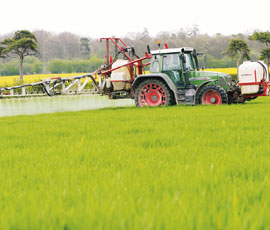Triazole fungicides vital for EU wheat production

The EU would no longer be self-sufficient in wheat production if triazole fungicides were to be withdrawn, according to a new report.
Carried out by Italian research institute Nomisma2, the economic and environmental consequences of withdrawing triazole products would be severe, with a forecast 12% drop in yields wiping €4.6bn off the value of EU wheat production by 2020. An extra 14% cultivated area would, therefore, be needed to maintain the EU’s self-sufficiency in wheat.
In particular, EU crops would be critically vulnerable to septoria, the most economically damaging pathogen of European wheat.
The study was commissioned by the crop protection industry to evaluate the economic significance of the triazole class of actives in EU agriculture. Taking wheat as a case study, it considered both a short-term effect analysis (2013) and a longer-term one (2020) to include the effects of increased selection pressure and the development of resistance to alternative fungicides.
Crop Protection Association director of policy Anne Buckenham said: “This study underlines the vital contribution of triazole-based fungicides in maintaining the productivity and competitiveness of EU cereal production.
“Septoria is a devastating fungal infection that can cause yield losses of up to 40% in wheat, and triazoles provide the basis for European disease control programmes.
“Recent research has demonstrated that by using a range of triazole-based products farmers can maintain their resilience and effectiveness, but the ever-present threat of septoria resistance highlights the need for continued research and innovation by the crop protection sector,” said Dr Buckenham.
Read more
Read more on the lessons learned from this season on controlling septoria

